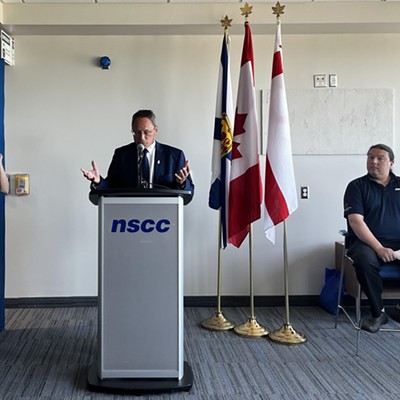Nova Scotia’s universities are scrambling to grasp the implications of a new provincial funding agreement, announced last week. On Friday Feb. 2, the Department of Advanced Education presented their replacement plan for the current memorandum of understanding—or MoU—signed by Nova Scotia and all 10 provincial universities in 2019. That five-year MoU will expire on Mar. 31, 2024.
Instead of another long-term model, the province is opting for one-year bilateral agreements with each university. The province’s release says these new and shorter funding agreements will “cap tuition and spur more action on student housing.” In a press conference on the new agreements, the province said a five-year agreement isn’t dynamic enough to respond to the sort of rapid changes that have affected Nova Scotia over the last 18 months, including labour shortages, inflation, housing shortages and population growth.
There are positive takeaways from the agreements. For example, a 2% cap on tuition increases for all Nova Scotian undergrad students. But there are some not-so-positives, too, such as a mandatory 9% increase in international student tuition for each school. (Dalhousie University and the University of King’s College are exempt because they’ve increased their international student tuition by more than 9% in the past year.)
Another positive is the province asking universities to show their work. Every school will submit a strategic proposal looking ahead to 2025-to-2028, showing how they will meet housing, labour market and healthcare needs for students and the province.
Then there are ambitious housing takeaways that single out three schools—Dalhousie, NSCAD and Cape Breton University. The new bilateral agreements put all HRM and Cape Breton universities on watch: provide student housing beds for 15% of full-time students, or show evidence of trying to make that happen by October 2025, or you might get slapped with an enrolment cap.
However, Dal, NSCAD and CBU are the only universities under that 15% housing threshold. As it stands, CBU is at approximately 5%, Dal is just short of 14% and NSCAD does not currently have any student housing beds—0%—says the Department of Advanced Education.
To reach a 15% coverage rate, based on 2023-24 full-time student enrolment, Dal would need to create 188 new beds, CBU would need 852 new beds and NSCAD would need 109 new beds.
NSCAD students have never lived on campus—there isn’t an option to. For those wanting campus housing, NSCAD tells students to contact residences of other universities in town, like UKing’s, Saint Mary’s University and Mount Saint Vincent University. NSCAD students pay the fee of whichever residence they live in. NSCAD confirmed through email that all students who applied for campus housing in summer 2023 received it. King’s confirmed there are currently NSCAD students living on their campus, which is at full capacity with 267 beds.
Missing from the terms of the bilateral agreements is any talk of lowering the cost of student housing to make it more accessible. As of today, the least expensive room and mandatory meal plan to live at UKing’s is nearly $11,000 for the school year–for a shared double room and 10 meals a week.
At Dal, a shared double room and meal plan equal to five meals a week costs over $11,000 for the school year. CBU’s least expensive shared dorm room plus mandatory meal plan is the highest of the three, at $11,175 for the school year including non-refundable fees. That’s nearly $1,400 a month for a shared room and board.
Another missing element from the new agreements is how universities should work with municipalities to add transit services to areas where students can’t find affordable housing near campus, like CBU students travelling an hour and a half by bus, when it isn’t overcrowded, from the north side of Sydney.
Lisa Lachance, the NSNDP spokesperson for advanced education and MLA for Halifax Citadel-Sable island calls the lack of mention of transportation and transit infrastructure for students who are “driving across the province to school because they can’t afford housing” a “glaring omission.”
Lachance’s riding contains four universities, including Dalhousie. They say the province could do things right now to help students with housing, like issuing rent control, but instead “we’re in a hurry up and not actually accomplish what we said we were going to accomplish.”
Lachance calls the agreements “disappointing,” saying they’re less “agreements” and more “edicts” because they don't reflect the conversations with universities over the past months.
Cuts to funding in some areas might lead to increased costs in other areas, for example the fact that there's no cap on how much schools can increase international students tuition in these agreements. The two schools with the largest percentage of international students are Dal and CBU. They both stand to lose funding if they don't hit the unique housing targets in their agreements.
If they don’t show evidence of plans to add at least 200 and 300 beds, respectively, by the time the current MoU expires, both stand to have 10% funding withheld. That’s a potential loss of $22.9 million for Dal and $2.9 million for CBU. Dal is Nova Scotia’s largest university and received $229 million in provincial funding—compared to their $258.9 million in tuition and fees—in 2022-23. Over the same period, CBU received $28.9 million in provincial funding, compared to their $84.3 million in tuition and fees.
Dal can only lose funding with their new bilateral agreement which freezes their amount for the following year at the amount they received in 2023-24. If the province isn’t satisfied that Dal’s strategic proposal for 2025-28, due this summer, outlines “how they will advance government priorities such as healthcare, housing and supporting labour market needs,” Dal can see 2% of their funding withheld, roughly $4.6 million.
Dal’s president Kim Brooks wrote a memo to the Dal community the day the bilateral agreements were announced, saying the “good news” is that the province is asking for engagement with Dal “ on critical issues like health care and housing–that’s work we’ve already been doing,” writes Brookes, saying they’re “developing an ambitious housing program, with intent to break ground on new construction within 24 months.”
It remains uncertain how universities will execute the terms of the new agreements which the Department of Advanced Education says are “moving forward...as announced” and that they “fully expect this process to advance smoothly with all institutions having bilateral agreements by March 31st, 2024 in order for funding to flow.”












